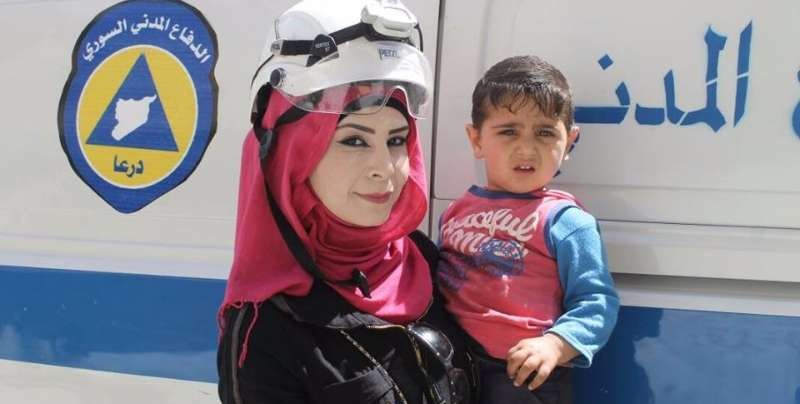In 2013 a woman, eight months pregnant, is running down the street. She’s looking for someone who can help her husband, wounded by the bombing of Assad regime warplanes and lying on the floor of their home.
“I didn’t find anybody, and my husband bled to death,” Abeer says.
Three years later, as the bombs continue to fall on Daraa in southern Syria, Abeer al-Thawra is the “someone” trying to save lives.
A mother of five young children, Abeer joined the White Helmets, the volunteer civil defense organization which has rescued thousands of people in Syria’s conflict and retrieved the bodies of many others.
“It’s hard to see someone close to your heart dying in front of you, and you’re powerless to help them,” Abeer says. “That’s why I decided to join the Civil Defense.”
Abeer has faced hostility as a woman working alongside men, but she says that she is indifferent to it:
People’s criticism comes from a place of fear. Society doesn’t accept a woman in an ambulance; it’s considered work for men only. But when there’s a bombing, and the wounded person is female, people feel the need for it.
She responds by touring around Daraa Province to raise awareness about basic first aid, encouraging women to be involved in their communities:
I call on all women to act, to get out into the field and not limit themselves to staying at home. Society is in dire need of you. Under our circumstances, it’s necessary to have a paramedic in every home.
Society is in dire need of you. All of us as women must realize our active role, and the greater responsibility we have after the war, and to contribute something, no matter how small. We must stand alongside men to realize balance in society.
Three years after the Assad regime’s murder of her husband, Abeer is resolute about her choice to try and prevent the deaths of others:
The circumstances that Syria is going through are not an excuse for inaction and fear. Rather, they are the primary motivation to act.
Losing those we love, and the pain that comes with that determines how we see things. It gives us two choices: either we give up and live in grief, or we take those moments and turn them into the strength to get up and keep living.”
(hat tip to Syria Direct and Orient News for original story)

